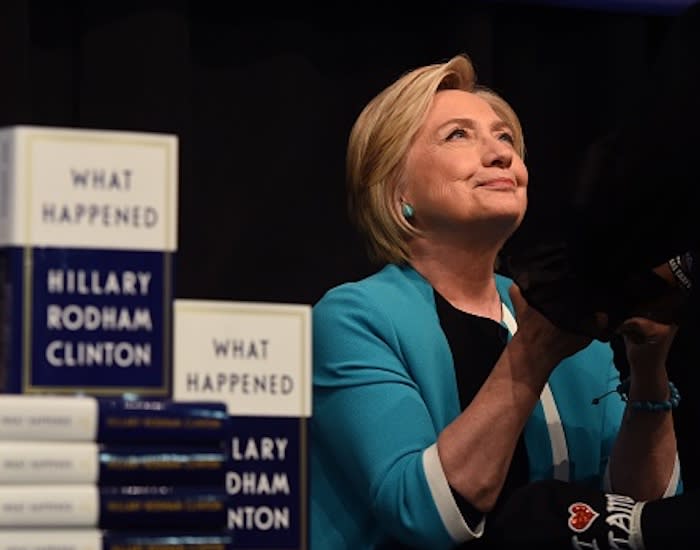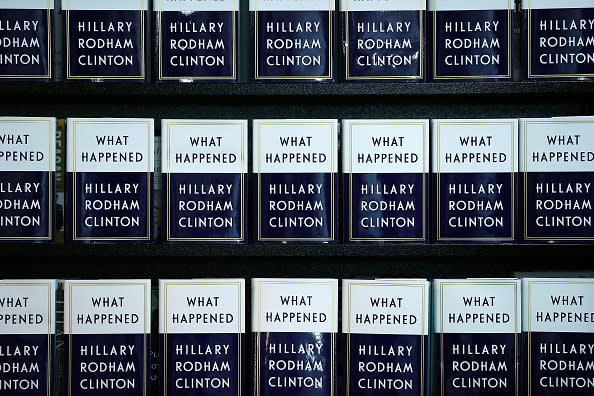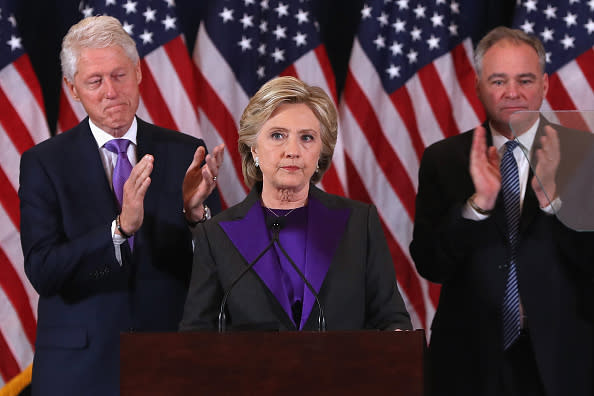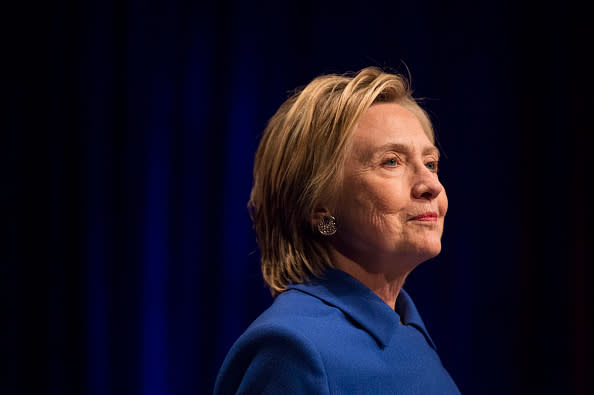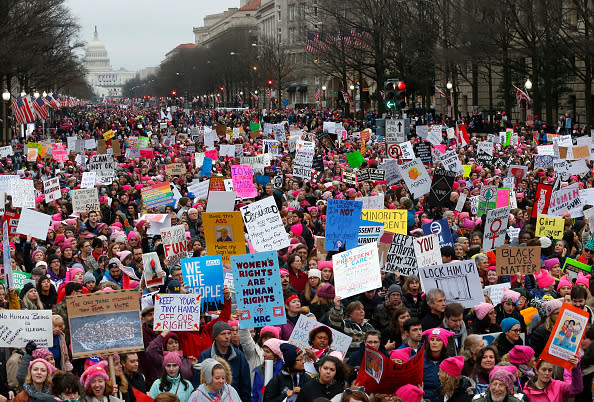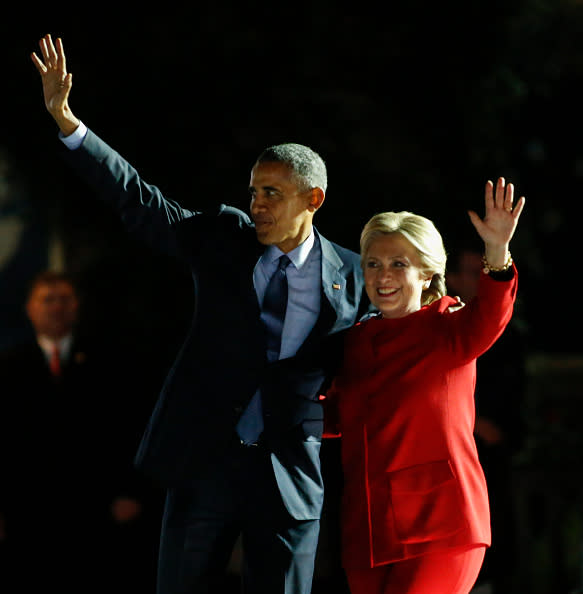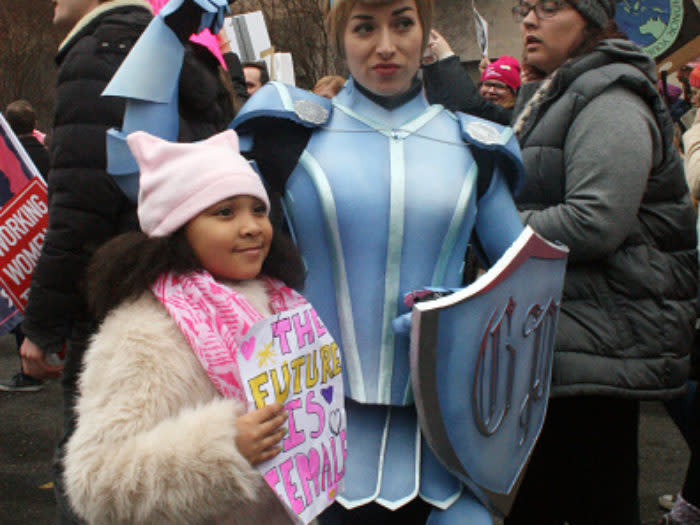Here are 13 of the most important moments in Hillary Clinton’s new book, “What Happened”
If you’re still reeling from the results of the 2016 presidential election, Hillary Clinton’s new book What Happened won’t be an easy read. I was approximately 10 pages in before I burst into tears because, like so many others, I remain completely devastated by what happened on November 8th.
But, despite the loud complaints from the right and left, What Happened is an important book. It’s fairly standard practice for presidential candidates to write memoirs reflecting on their campaigns, and the anger surrounding Clinton’s book is yet another example of the infuriating double standard she faces.
Furthermore, she was the first female presidential nominee of a major party — and last time I checked, making history is a pretty big deal. Despite the fact that Clinton lost the electoral college vote, there’s certainly a lot to be learned from What Happened — especially because there are a number of up-and-coming female politicians who could be strong contenders in 2020 and beyond.
What Happened devotes a significant number of pages to Clinton’s policy platforms, but it’s also incredibly raw. Clinton expresses a level of emotion and anger that she previously has kept well-hidden.
If you’re still too down to spend hours re-living the nightmare of the 2016 election, it’s okay to wait until you’re ready to read What Happened. (Although I highly recommend that everyone read it at some point.) Until then, here are 13 important, interesting moments in the memoir that stand out.
1. Her concession speech suit was intended for an entirely different occasion.
As a symbol of bipartisanship and unity, both Hillary and Bill Clinton wore purple when she delivered her concession speech. She had originally planned to deliver an acceptance speech wearing a white pantsuit in honor of the suffragettes.
The black and purple pantsuit she ended up wearing on November 9th had been in her closet for a different purpose — she intended to wear on her first trip to Washington as president-elect in order to send the same message of unity.
2. She was inspired by Emily Doe’s powerful open letter.
The Stanford rape survivor, Emily Doe, concluded her powerful open letter by telling girls and women everywhere that she stands with them. “You are important, unquestionably, you are untouchable, you are beautiful, you are to be valued, respected, undeniably, every minute of every day, you are powerful and nobody can take that away from you,” Doe wrote.
As Clinton began working on her concession speech in the early hours of November 9th, she thought of Doe’s letter and re-read it. It inspired the now-famous conclusion to her concession speech: “To all the little girls who are watching this… never doubt that you are valuable and powerful and deserving of every change and opportunity in the world to pursue and achieve your own dreams.”
“I hope I can meet [Emily Doe] someday and tell her how brave I think she is,” Clinton writes in What Happened. “Wherever she is, I hope Emily Doe knows how much her words and strength meant to say many.”
3. After the election, she thought back to a childhood game she played with her father.
As she described in a previous memoir, Living History, Clinton’s father was tough on her. He’d frequently undermine her achievements by saying things like, “It must have been an easy test if you got an A.” In What Happened, she recalls a childhood game in which she’d ask him “Would you still love me if…?” For example, he told her that he’d love — but not like — her if she robbed a bank.
“Once or twice last November, I thought to myself, ‘Well, Dad, what if I lose an election I should have won and let an unqualified bully become President of the United States? Would you still love me then?'” Clinton recalls in What Happened.
4. She was deeply moved by Kate McKinnon’s post-election performance on Saturday Night Live.
Unlike Trump, Clinton had no problem being spoofed on Saturday Night Live. She has always been a fan of Kate McKinnon — they even had dinner together in New York City in February and McKinnon thanked Clinton for her “grace and grit” in her Emmy acceptance speech on September 17th.
Clinton watched SNL‘s post-election episode in which McKinnon got into character one last time and performed Leonard Cohen’s song “Hallelujah.” If that cold open made you tear up (*raises hand*), you’re in good company.
“As she sang, it seemed like she was fighting back tears,” Clinton writes. “Listening, so was I.”
5. No, she doesn’t “blame everyone except herself.”
Clinton very fairly spends time discussing the roles of Russian interference, James Comey’s 11th hour announcement (which Nate Silver concluded almost definitely cost her the election), sexism, and biased media coverage that failed to focus on her policies.
She’s angry about these things and certainly has a right to be — but Clinton also makes clear that she’s extremely angry with herself.
“You can blame the data, blame the message, blame anything you want — but I was the candidate,” Clinton writes. “It was my campaign. Those were my decisions… I had tried to learn the lessons of 2008, and in many ways ran a better, smarter campaign this time. But I had been unable to connect with the deep anger so many Americans felt or shake the perception that I was the candidate of the status quo.”
In another passage, she writes that “My mistakes burn me up inside.”
As Rebecca Traister points out in a recent column for New York Magazine‘s The Cut, “Those who continue to insist on hearing Clinton’s reasoned rage as a means to deflect blame are missing perhaps the object of her most blistering ire: herself.”
6. She’s happy to take a selfie with you — but she’d rather chat.
Clinton supporters were thrilled to see her smiling in the woods near her Chappaqua home on November 10th, thanks to a photo taken with a neighbor. These days, she can’t go anywhere without receiving a much-deserved standing ovation. When supporters stop her on the street, she notes that they often want to take selfies. Although Clinton is happy to oblige and pose for a photo, she says she’d prefer to spend those precious few minutes actually talking.
Mom taking a hike runs into @HillaryClinton this afternoon (Photo: Margot Gerster) @billclinton took the photo pic.twitter.com/FXQNW6iA0q
— Michael Cappetta (@MCappetta) November 10, 2016
7. She believes Trump wants to be like Putin.
Clinton doesn’t mince words about Putin or Trump in What Happened, and she believes that Trump’s admiration for the Russian president is deeply disturbing.
“[Trump] doesn’t just like Putin — he seems to want to be like Putin, a white authoritarian leader who could put down dissenters, repress minorities, disenfranchise voters, weaken the press and amass untold billions for himself. He dreams of Moscow on the Potomac,” she writes.
8. She makes a distinction between sexism and misogyny.
Although the words are frequently used interchangeably, Clinton details how she defines each term.
“Sexism is all the big and little ways that society draws a box around women and says, ‘You stay in there.’ Don’t complain because nice girls don’t do that. Don’t try to be something women shouldn’t be. Don’t wear that, don’t go there, don’t think that, don’t earn too much. It’s not right somehow, we can’t explain why, stop asking,” she writes.
Clinton points out that everyone can buy into sexism occasionally, often without noticing it. It is so pervasive that we often don’t see it. Misogyny is a different animal.
“Misogyny is something darker. It’s rage. Disgust. Hatred. It’s what happens when a woman turns down a guy at a bar and he switches from charming to scary. Or when a woman gets a job that a man wanted and instead of shaking her hand and wishing her well, he calls her a bitch and vows to do everything he can to make sure she fails.”
9. She’s encouraged by the recent outpouring of activism — but she wishes it had come sooner.
Clinton recalls being inspired by the Women’s March and the outpouring of activism resulting from Trump’s election. She’s encouraged that more women are running for office. She is eager to help get women elected and finally shatter that hardest, highest glass ceiling.
But she’s also blunt about the fact that a lot of people rested on their laurels (and some didn’t even bother to vote) during the most important election in recent history.
“I couldn’t help but ask where those feelings of solidarity, outrage, and passion had been during the election. Since November, more than two dozen women — of all ages, but mostly in their twenties — had approached me in restaurants, theaters, and stores to apologize for not voting or not doing more to help my campaign,” Clinton writes. “I responded with forced smiles and tight nods. On one occasion, an older woman dragged her adult daughter by the arm to come talk to me and ordered her to apologize for not voting — which she did, head bowed in contrition. I wanted to stare right in her eyes and say, ‘You didn’t vote? How could you not vote?! You abdicated your responsibility as a citizen.'”
Let’s be honest — it would be strange if Clinton didn’t feel this way.
10. She’s not letting Comey off the hook.
The October 28th Comey letter likely cost Clinton the election (early voting was already underway in multiple states). She doesn’t hold back on her criticism of how Comey harped on her emails without saying a word about the Russia investigation.
“Comey made a choice to excoriate me in public in July and then dramatically reopen the investigation on October 28, all while refusing to say a word about Trump and Russia,” she writes. “If not for those decisions, everything would have been different. Comey himself later said he was ‘mildly nauseous’ at the idea that he influenced the outcome of the election. Hearing that made me sick.”
11. Obama offered kind words of support when she called him on election night.
“My throat tightened. The president said everything right. He told me I’d run a strong campaign, that I had done a great deal for our country, that he was proud of me,” she recalls. “He told me there was life after losing and that he and Michelle would be there for me. I hung up and sat quietly for a few moments. I was numb. It was all so shocking.”
Shortly after the phone call, Trump narrowly won Wisconsin and it was the final nail in her campaign’s coffin. Clinton called him to concede.
12. She can empathize with some Trump voters, but there’s a double standard when it comes to empathy.
Clinton writes that she empathizes with the Trump voters who couldn’t vote for her after reading the Comey letter, who believe that no party should control the White House for more than eight years, and for those who are morally opposed to abortion. She also sympathizes with the people who were conned by Trump’s false promises. But when it comes to the voters who spew hate and cheer for bigotry, sexism, racism, and homophobia, Clinton has no tolerance — and she wants to know why the media isn’t holding them accountable.
“I have no tolerance for the intolerant. None. Bullying disgusts me. I look at the people at Trump’s rallies, cheering for his hateful rants, and I wonder: Where’s their empathy and understanding? Why are they allowed to close their hearts to the striving immigrant father and the grieving black mother, or the LGBT teenager who’s bullied at school and thinking of suicide?” she asks. “Why doesn’t the press write think pieces about Trump voters trying to understand why most Americans rejected their candidate? Why is the burden of opening our hearts only on half of the country?”
I’d like answers to these questions, too — and I’d venture a guess that I’m in the company of about 66 million people.
13. She believes there will be a woman president in her lifetime.
Clinton describes meeting women in their 90s and early 100s who had waited their entire lives to vote for a female presidential candidate. As she said in her concession speech on November 9th, “I know we still haven’t shattered that highest and hardest glass ceiling but someday, someone will. And hopefully, it’ll be sooner than we might think right now.”
She echoes this sentiment again in What Happened and makes clear that she plans to live long enough to see a woman elected president.
